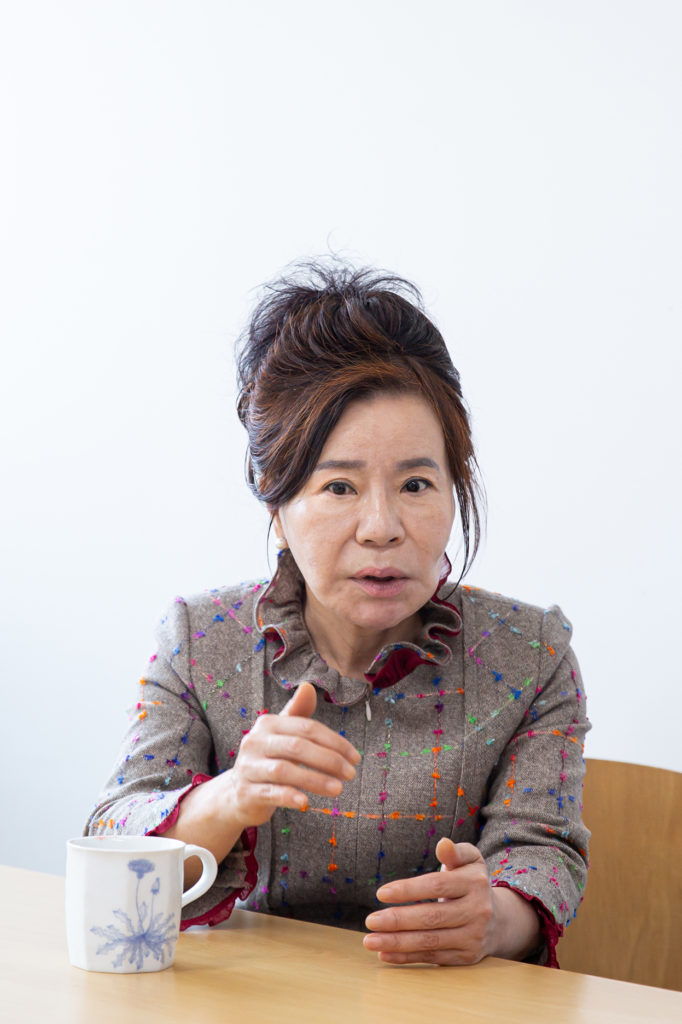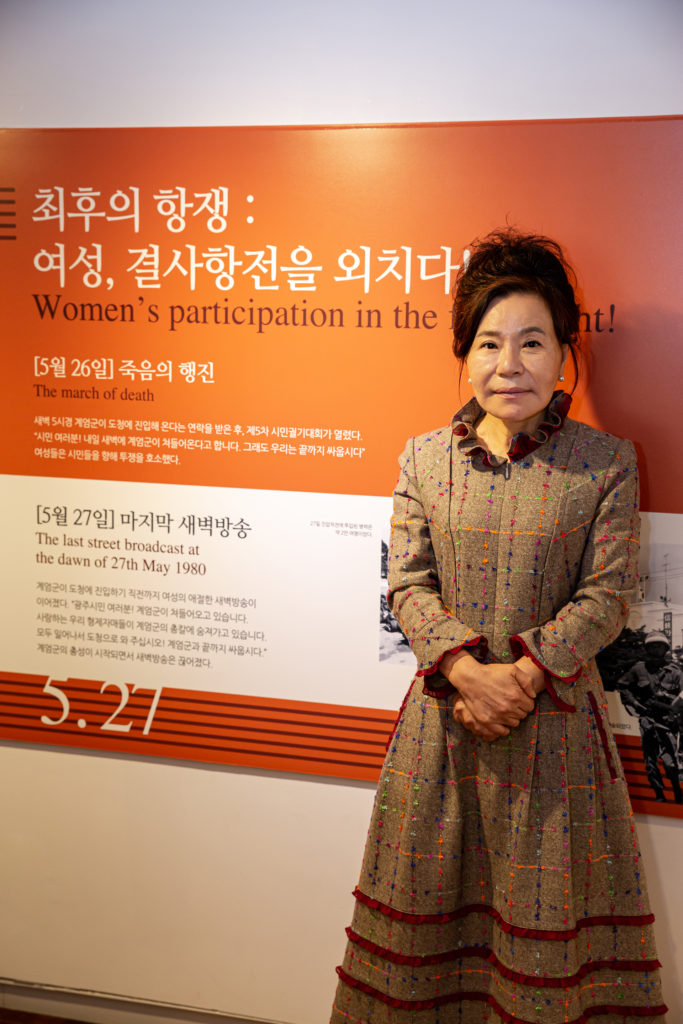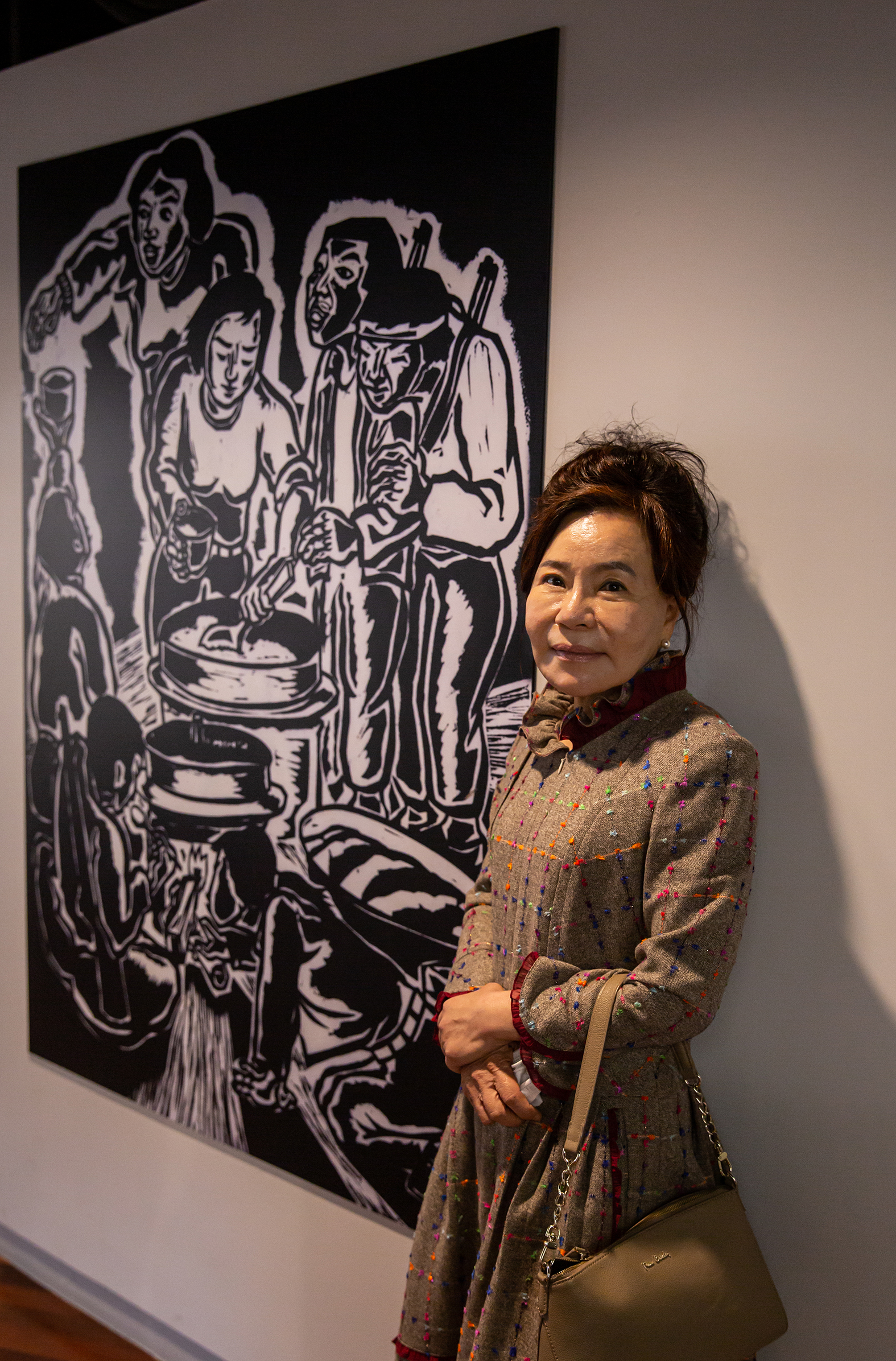May 18: Participant Recollections
Interviews with Park Young-sun and Ahn Giljeong.
Interviews by Jeong Jiyeon and Melline Galani.
Photographs by Yunkyoung (Hillel) Kim.
“May 18” or “5.18” is shorthand for the Gwangju May 18 Democratic Movement, the ten-day “incident” that took place in Gwangju in May of 1980. As part of the Gwangju News’ recognition of the 40th anniversary of this event, we bring you two interviews by two individuals who took a stand against the brutality of the martial law troops – two individuals who were occupants of the Provincial Office and apprehended by the troops, two individuals imprisoned for their stand against tyranny and who have lived to tell their stories. The first of the two interviews is with Ms. Park Young-sun whose loudspeaker voice was heard throughout much of Gwangju during the bloodiest days of the uprising. The second is with Dr. Ahn Giljeong, a student protester at the time, who has now devoted himself to unveiling the truths about May 18. — Ed.
INTERVIEW WITH MS. PARK YOUNG-SUN
Gwangju News (GN): Thank you for agreeing to do this interview for the Gwangju News about the events surrounding the May 18 Democratic Uprising. To start off, could you please briefly introduce yourself?
Park Young-sun: My name is Park Young-sun, and I am the woman who did the last broadcast of the Gwangju Uprising on May 27, 1980.
GN: Could you please describe you own experience during the events of May 1980 and how you got involved?
Ms. Park: At the time, I was attending Songwon University and worked as a gayageum teacher at Gwangju Girls High School, and we were preparing for the Honam Arts Festival in May. On May 20, I remember there were only rumors that protests had taken place in Gwangju, but I had never actually witnessed any. So, every day my students and I practiced through the afternoon and returned home by bus. Then on the 21st, I finished practice in the morning to let the girls return home because all the bus service had stopped that day. At about 1 or 2 p.m., I was in the area of the Provincial Office trying to go home, when I suddenly heard gunshots and screams from every direction. At that moment, a van approached me, and I was asked by a male student riding inside to make a street broadcast to the people. Without a second thought, I got in the speaker-equipped van and started the street broadcasts.

GN: Could you describe in detail the situation at the time of your last broadcast?
Ms. Park: From May 21 to 26, I made street broadcasts from the loudspeaker van, driving around Gwangju and its outlying areas, telling about the situation around the Provincial Office, including returning firearms, making blood donations, and scheduled street events. Normally, I would return home in the broadcasting vehicle before sunset, but on the 26th, I was about to leave the Provincial Office after sunset. However, I met a middle school girl who hadn’t gone home in the hallway near the broadcasting room, and I stayed up all night with her in the building until the martial law forces assaulted the building at around 2 or 3 a.m. In order to spread the news, I sent out the last broadcast through the building’s rooftop speakers so that all of Gwangju would be aware of what was happening. After that last broadcast, random gunfire hit the transmission room as soldiers yelled at us to come out on our knees with our hands raised. As soon as I left the room, I was crushed by boots and fainted.
All the people from the building, including me, were taken to the plaza in front of the Provincial Office with our hands and feet tied. I was briefly awakened by the sounds of soldiers’ voices verbally abusing me and then immediately fainted again.
The next day, I woke up at the Sangmu Gymnasium across from the Provincial Office. Among those arrested, I was the only woman. Later, I found out that senior citizens, women, and children were ordered to leave the Provincial Office plaza area at a citizen’s rally the day before, on May 26. I was later sent to the Gwangsan Police Station, where I met Cho Mi-ran, Lee Hye-shin, Cha Myung-soo, and Jeon Ok-ju. I was taken to a general hospital with Jeon Ok-ju due to the deterioration in my physical condition, but the interrogations continued at the hospital.
The policeman, who oversaw the investigation at the time, told me that it would be difficult to reduce my punishment because of the last broadcast I had made from the Provincial Office. In a subsequent military trial, I was sentenced to one year in prison for “violation of the martial law and rebellion,” I was released on parole on October 31 of that year.
GN: How did your life change after this experience?
Ms. Park: In 1982, I married my husband and left Gwangju. Later, I hid my identity and stayed quiet, never telling even to my family about May 18. Then, in 1990, for the first time, I made my voice heard to the world through an interview and documentary, “Mother’s Song.” I had been particularly furious about the distortions and misinformation put out by MBC Broadcasting Corporation and the print media company, The Hankyoreh, and after that, I was booked for interviews with various media for six months to correct the truth about May 18 and to fight against the false reports.
GN: What are the most vivid memories that you have of your ordeal?
Ms. Park: While I was detained at the police station, I was subjected to interrogations, torture, verbal sexual violence, and deceptive talk about whether to sentence me to death or life in prison. I have lived not only with physical pain due to head and back injuries but also with emotional pain due to the public controversy over the midnight broadcast and regrets over my life that was changed completely due to that last broadcast. I witnessed several scenes of fellow citizens being severely assaulted and tortured, and I am still traumatized by those images. A total of 147 people were arrested by provincial authorities, were subjected to military trials and imprisoned, and were then branded as criminals after release from prison, causing them to suffer extreme living difficulties and mental distress. Eventually, about 60 of them chose to commit suicide.
GN: Do you think you would make the same choices if you could go back to that time?
Ms. Park: Without a doubt. I saw citizens, innocent people, dying in front of my eyes. Anyone, would have done the same as I did.
GN: There are still various falsehoods circulating about the events of May 18. What do you think about this?
Ms. Park: Conservative parties are still distorting the May 18 events over several issues, including that the uprising was a conspiracy and an organized protest against the military government, and that the protesters were spies brought down from North Korea, but all of these are obvious lies. The reason why the May 18 pro-democracy movement seemed to be a series of democratization protests and have continuity is that there had been demonstrations and protests taking place intermittently against the policies that suppressed Gwangju at the time. Also, the rumor that the uprising was instigated by North Korean spies is absurd because almost every citizen of Gwangju participated in the fight and sacrificed themselves. It was only a continuation of unrest due to the situation of the times, a series of pro-democracy protests that took place before May 18. It was a pro-democracy movement to defend Gwangju against the martial law troops who ruthlessly slaughtered innocent citizens.
I think all Gwangju citizens deserve respect – not only those who fought in front of the Provincial Office but all those who had helped in the movement, including women who donated blood and made rice balls for the protesters, and those who made and distributed masks – all the citizens of Gwangju who helped in the pro-democracy movement.
GN: What would you say to the younger generation of Koreans?
Ms. Park: Forty years after the event, people can still easily find distorted accounts on the internet. However, people do not think that even this freedom of speech can be enjoyed by the nation’s democratization. Had it not been for Gwangju’s May pro-democracy movement in 1980, there would have been no democratic society like we have today. I hope that young people are aware of the Gwangju Democratic Uprising with factual information and remember this heartbreaking incident in which innocent citizens were beaten and slaughtered by the military of their nation.

GN: Thank you, Ms. Park, for your vivid recounting of your traumatic experiences during and after the Gwangju pro-democracy movement. It has been most enlightening.
INTERVIEW WITH DR. AHN GILJEONG
Gwangju News (GN): Good day, Dr. Ahn, and thank you for agreeing to talk with the Gwangju News about the May 1980 Gwangju Uprising. Could you first briefly introduce yourself?
Dr. Ahn Giljeong: Well, I’m not from Gwangju originally, but I attended school here, from elementary school and finishing with university. For over fourteen years, I worked as an editor for a children’s book publishing company. In 2007, I conducted research on Korea’s middle ages and the Joseon Dynasty. And from next month [May], I’m planning to start as a researcher for the May 18 Memorial Foundation’s Truth Investigation Commission.
GN: Please describe your own experience during the May 1980 events and how you became involved in them.
Dr. Ahn: To talk about the Gwangju’s May 18 Democratic Movement, firstly you need to know about the Yushin Constitution. President Park Chung-hee had the Yushin Constitution adopted in December 1972, which made it possible for him to stay in power for the rest of his life. It was a system that repressed democracy. There were nationwide campaigns against him, centered around the universities. I also participated in the anti-Yushin protest at Chonnam National University on June 29, 1978, and as a result, I was imprisoned for about a year and two months. Even after the incident, major events in Korean history continued – the assassination of Park Chung-hee on October 26 [1979] and the military coup of December 12 [1979] by Chun Doo-hwan – and in March 1980, there was a massive anti-government protest in Gwangju. Then in May, the government ordered the nation to expand its martial law to subdue the protests. The May 18 (5.18) democratization movement can be said to have been an inevitable outbreak under these unacceptable circumstances. At the time of the uprising, I was in charge of recruiting students to our cause, which was part of the protesting students’ management committee based in the Provincial Office.
GN: What has driven you to devote so much of your life to uncovering the facts of the Gwangju Uprising?
Dr. Ahn: Actually, I didn’t come to this with a sense of mission. Rather, I was naturally interested in the events in my personal history, and the research activities of the 5.18 Memorial Foundation are also related to my career as a researcher. We have mainly focused on unveiling the truth about who fired first on May 21 and the identification of the victims in the process of suppressing the protests. There are still many truths left to be revealed, such as debunking the martial law forces claim that they only returned fire because citizens shot first.
GN: What are the major falsehoods about the Gwangju Uprising that are still widely spread and believed?
Dr. Ahn: One of the most widely known facts is the distortion of the cause of death of Yoon Sang-won, a symbolic figure of the May 18 Democratic Movement. Yoon Sang-won is one of 16 people who died during the martial law troops’ dawn assault on the Provincial Office building [the location of the protesters’ last stand] on May 27, and the exact cause of his death has been hidden with false information such as suicide, grenade suicide, and suicide by setting himself on fire. Based on Yoon Sang-won’s death report, witnesses’ statements, and fabricated statements by soldiers, I want to reveal the true cause of Yoon’s death and further prevent other 5.18 victims from having their deaths distorted. I think there is still a lot of work left to do regarding this fact-finding, especially for the sake of the country, so that the facts can be properly known for future generations.
GN: How did your life change after the experience?
Dr. Ahn: I’m not the only one who experienced physical and mental pain at the time of the incident, so I shouldn’t even mention this, but of course, I’ve had trauma since I was in prison. And since the social atmosphere towards the participants in the May 18 Democratic Movement was not favorable at the time, it was difficult for me, too, to live a normal social life for about three years.
GN: Have you ever thought about what life might have been like if it hadn’t been for the May 18 events?
Dr. Ahn: I don’t know. I only responded spontaneously to an unexpected situation. I think I’ve gotten to where I am today by bumping into unexpected situations.
GN: Thank you, Dr. Ahn, for sharing with us your first-hand account of the May 18 events and for your ongoing efforts to uncover the still concealed truths about the May 18 Democratic Movement.







